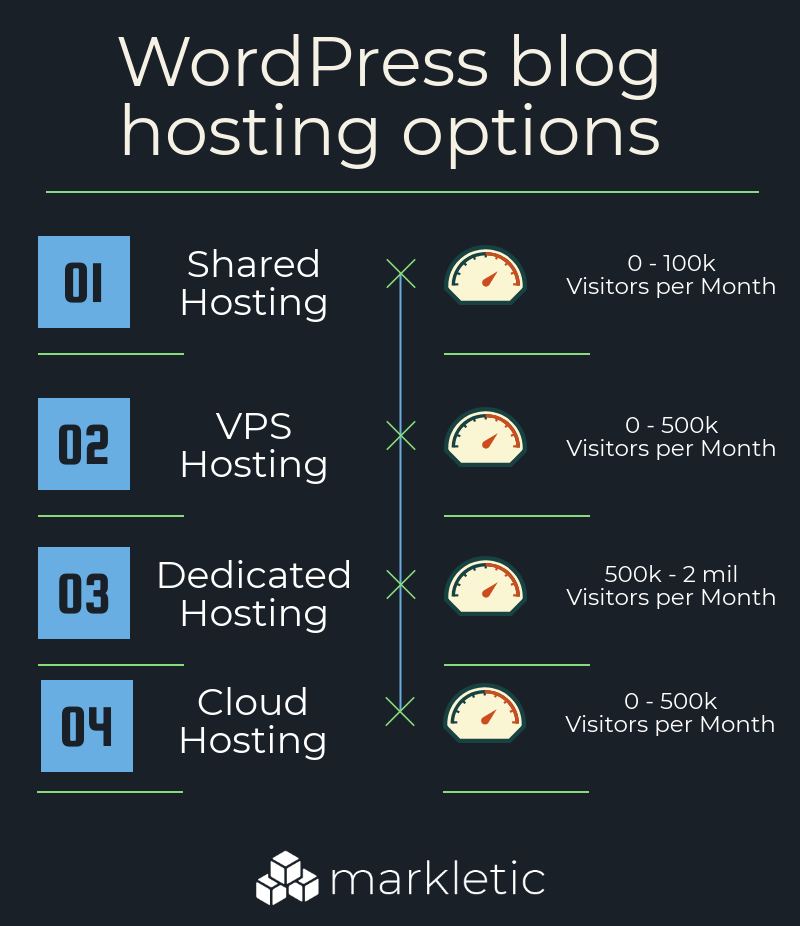How to Select Your WordPress Blog Hosting Provider

Table of Contents
You are thinking of creating a blog, or maybe even changing to another hosting provider for your WordPress blog. We’ve all been there, spending hours and hours on doing research. With so many different opinions and recommendations out there, it is hard to select the best option. In this post, I’ll tell you the truth about selecting your WordPress blog hosting provider.
Now, I apologize in advance, WordPress blog hosting isn’t the most fruitful topic to talk about, but I’ll try to keep it exciting. Haha.
In a previous post, I mentioned that selecting the right hosting provider is critical to the success of your blog. However, with so many options out there, it might be confusing to select the correct option. This post will clear that up!
The common pitfalls
I’ve done hours of research on WordPress blog hosting providers, and to be quite frank, I was quite annoyed to see so many bad recommendations on heaps of blogs. Doesn’t everyone want what is best for their readers!? I know I do.
The fact of the matter is that most bloggers get paid to promote certain WordPress blog hosting providers. This means that they are also recommending bad hosting providers which pay a lot of money. From an economic standpoint, that makes total sense, but their readers are suffering from the consequences. Let’s not even get started about the ethics.
You will see that the majority of blogs recommend hosting providers such as Bluehost and Hostgator. These companies are part of the conglomerate called Endurance International Group (EIG). EIG is one of the largest hosting providers out there. They’ve achieved this by acquiring smaller companies such as the earlier mentioned hosting provider Hostgator.
If you are considering selecting a WordPress blog hosting provider under the Endurance International Group, then please do me a favor. Grab your shoes, some water and run very far away from the EIG.
At the surface, they look alright because so many famous bloggers recommend them. However, if you dig a bit deeper, and research what the experts say about the Endurance International Group, you will soon find out that is not where you want to host your blog.
If you build a fantastic house in the ghetto, not many people will come to visit you.
So why do bloggers recommend them?
Great question! The reason why you see so many reviews and recommendations about companies under the EIG umbrella is that they pay reviewers and bloggers good money to write reviews about them. This is called affiliate marketing. Now, don’t get me wrong, I’m a big supporter of affiliate marketing, but it allows for companies with deep pockets to create a tremendous amount of noise on the internet.
I will never recommend products to my readers that I don’t use myself or that I don’t believe in. You amazing people are Markletic’s lifeblood and I want what is best for you. I want you happy and I want you to return to my website.
If you would leave this page right now, please take this advice with you: Don’t pick a WordPress blog hosting provider underneath the EIG umbrella.
What makes these companies so awful?
Great question! Whenever EIG acquires a hosting provider, they stop investing in new technologies and lay off support staff. This means that:
- Your website is not hosting on the latest and fastest servers out there. Page speed directly affects your SEO efforts. A slow website will not rank well.
- Whenever you have issues with your website hosting, it will be a challenge to get decent support. If there are issues, you want it solved instantly.
Don’t take my word for it, have a look at this subreddit or do a few Google searches and find out for yourself.
All aboard the rocket ship
Now, I’ve told you what not to do. That’s not why you are here. You want to know what you actually should be doing! Let’s launch your blog into space.
As part of Atheltic Digital Marketing, you need to be doing everything right to make your blog a success. Selecting your WordPress blog hosting provider is the first step in launching a successful blog. Well actually, no-one will launch a successful blog. Creating a successful blog takes a lot of time and hard work! Never underestimate that! 🙂
When selecting your WordPress blog hosting provider you have 4 key options:
- Shared hosting;
- Virtual Private Servers (VPS) hosting;
- Dedicated hosting;
- Cloud hosting.
Below I’ve created an overview to give you an indication of which option is right for you.
1. Shared hosting
Shared hosting is where most people start and it is precisely what it sounds like. With shared hosting, your website is living on the same server as other websites. You can compare this to students living in an apartment complex and sharing many resources.
However, with shared hosting, there might be hundreds and sometimes even thousands of students living under the same roof.
The most significant advantage of shared hosting is that it is cheap, as you are sharing costs with everyone else. The biggest disadvantage of shared hosting is that you are also sharing all the resources, such as RAM and CPU speed.
Shared hosting is a bit outdated for this day and age. More advanced technologies such as cloud hosting have become much more affordable and have much higher performance.
2. VPS hosting
VPS stands for Virtual Private Servers. VPS hosting is the next level up from shared hosting. A VPS is still a shared environment, but the way it is set-up differs significantly from shared hosting.
You can imagine shared hosting to be like living in a gated community. You are still sharing the property with people, but everyone has their own house and resources. Also, everyone can decorate the house as they wish. In technical language, this means that people can customize their server settings as they wish. This is not possible in shared hosting.
The most significant advantage of VPS hosting is that it is much more reliable, flexible, faster and stable than shared hosting. On top of that, fewer residents are living on the same property. A VPS also allows you to fully customize the server settings.
With shared hosting, there can be hundreds of website hosted on the same server. Whereas, with VPS hosting, there will only be like 10-20 websites hosted on the same server.
There aren’t many downsides to VPS hosting. The biggest downside would be that it is a bit more expensive. VPS hosting is also less reliable than cloud hosting.
3. Dedicated hosting
Dedicated hosting is for the big players, websites that get loads of traffic. I’m talking about hundreds of thousands of visitors per month. As the name implies, with dedicated hosting, you have a server all to yourself. This comes with many benefits but also with a bunch of downsides.
With dedicated hosting, there is no such thing as bad neighbors. No one is taking your resources, because you have it all to yourself. With shared hosting, if you have a bad website full of malware or criminal activities on your server, your own website might have to deal with the consequences. This can never be the case this dedicated hosting.
Another benefit of dedicated hosting is that you have full control of your server. You can pick the Operating System, tweak all the settings and do whatever you want.
The biggest disadvantage of dedicated hosting is the costs. Dedicated hosting is expensive, but if your website gets 200k visits per month, then you can probably shoulder the costs.
Another disadvantage is that you need to be experienced in setting up servers or hire a professional who knows what he is doing. Additionally, you are putting all your eggs in one basket. If your server fails, your website is down.
4. Cloud hosting
Cloud hosting really is the future of hosting. Cloud hosting can be compared to VPS hosting. The difference between VPS hosting and cloud hosting is quite simple to explain. With VPS hosting, you have one physical server. With cloud hosting, your website is part of thousands of servers worldwide from which your website can pick all the resources it needs dynamically.
Many websites and companies are shifting towards cloud hosting and for good reasons.
Advantages of cloud hosting
Cloud hosting has so many advantages that it is difficult to list them all. Therefore, I will state the most significant advantages of cloud hosting.
- Affordability. cloud hosting is very affordable. You can get a plan for as little as $10 per month. With cloud hosting, you only pay for what you use. You don’t have a fixed price. If you don’t use the resources, you don’t pay for it. Who doesn’t love that?
- Scalability. With cloud hosting, you can increase your server size as you wish. With traditional VPS hosting, you can only scale as much as your maximum server capacity. Let’s say your website is hosted on a 16GB server. This means you can never have a bigger server than 16GB. This is not an issue for cloud hosting.
- Reliability. Because your website is hosted on thousands of servers worldwide, your website will never go down. Your readers will always be able to access your website.
- Security. For the same reason, your website is safe from DDoS attacks. With a DDoS attack, your server is overwhelmed by a myriad of requests. With cloud hosting, these requests are spread over many servers which decreases the impact of the attack.
The main downside of cloud hosting is that your costs are not always predictable. Sometimes you pay less, sometimes a little bit more. Usually, it is good when you pay more, as your website will have more visitors!
My recommendation is to skip the shared hosting step and go straight to cloud hosting for your WordPress blog. This is also what I have done for Markletic. Why? Because page speed is an important ranking factor. If you want to achieve exponential marketing growth through growth hacking, you need a fast host.
There are many cloud hosting providers out there. I have an excellent experience with a particular provider. Their services are elementary to use and you can create your WordPress blog on cloud hosting in no time. Here is the complete step-by-step guide to set up your blog using cloud hosting.
Share this article





